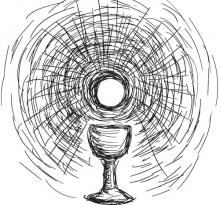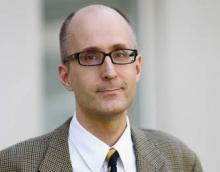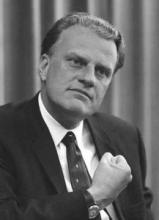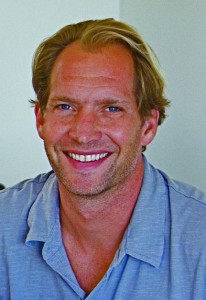Fundamentalism
Topeka’s Westboro Baptist Church takes in-your-face to a whole new level. The church is nothing if not an equal opportunity offender, from its burning of both a Quran and an American flag on 9/11 to its signs proclaiming God’s hatred for ... well, pretty much everyone. While Westboro, established by a lawyer named Fred Phelps in 1955, claims to be a Primitive Baptist Church, that denomination denounces the actions of the church as “deplorable.” The church boasts of conducting 47,770 demonstrations since 1991 proclaiming its gospel of hate—while taunting on its website that the number zero represents the “nanoseconds of sleep that WBC members lose over your opinions and feeeeellllliiiiiings.”
From Rebecca Barrett-Fox’s first visit to the church in 2004 until defending her dissertation “Pray Not for This People for Their Good” in 2010, the scholar became intimately acquainted with the people of Westboro in a way that few outsiders have. Barrett-Fox, now a professor at two Mennonite colleges in Kansas (Hesston and Bethel) and book review editor of The Journal of Hate Studies, conducted intensive ethnographic research on the church, joining members at Sunday services, pickets at memorials for gay and lesbian people, and outside the Supreme Court when it ruled in favor of the church’s right to demonstrate at military funerals.
Freelance editor and writer Joanie Eppinga (eagleeyeediting.com), who is the former editor and current assistant editor of The Journal of Hate Studies, met Barrett-Fox through Gonzaga University’s Institute for Hate Studies and interviewed her last April.
—The Editors
Joanie Eppinga: How did you become involved with Westboro Baptist Church?
Rebecca Barrett-Fox: I had grown up with fundamentalist Christianity, with a particular emphasis on the scary parts; I was born in the decade of Hal Lindsey’s The Late Great Planet Earth. My mom did a wonderful thing for us, which was to send us to every religious service that was available, in part I think because she wanted us out of the house. When I came to the University of Kansas, a group of friends and I decided to go to every religious service we could find, and that included Westboro Baptist.
What made you decide to move forward with your study?
In some sense, I felt called to it. So I spent a lot of time grounding myself in Calvinism. It was a long, dark winter! I wanted to historicize Westboro teachings, because I sensed early on that there was a lineage here in American intellectual and theological history. Then, in 2010, I studied them intensely through their Supreme Court trial, and traveled to the Supreme Court, though not with the church, to witness that process.

The Church is not a purity cult. We try to turn our institutions into purity cultus of behavior or belief all the time. We're really good at it. We've fought wars over our theologies wrapped in nationalism. We've crusaded from west to east all in the name of the purity of the Church. "Ex filio" was a war cry a thousand years ago.
Rachel Held Evans is right. Evangelicalism may very well be losing a generation and by extension, we all are. But then some of us have been losing parts of generations for a long time. Some of the Boomers walked never to return. More of Gen X did the same. Now the enormous generation of Millennials is having its say. Many are voting with their feet. They are tired of the culture wars. They are tired of the purity fights. Many people from various generations are. They are all voting with their feet. The same thing is happening in Catholicism though some are choosing to stay. If it weren't for the influx of Catholic immigrants to the US, we'd see the same statistical free fall in Catholicism that the mainline is experiencing.

Every so often, evangelicals get the urge to ex-communicate. Feminists, open theists, and universalists have all drawn the ire of their co-religionists. In the absence of a central religious authority, such efforts are doomed to fail.
According to most scholars, evangelicalism is more of a network than a unified church. Magazines, publishing houses, colleges, and parachurch groups play a bigger role than ecclesial bodies. While condemned from many pulpits, the emerging church continues to publish with Zondervan and Baker. Owned by the same company as Zondervan and Fox News (Rupert Murdoch’s News Corporation), HarperOne has provided a home for Rob Bell and his Love Wins.
Though it hasn’t been easy, Bell has remained a part of American evangelicalism.
Fried by their battles with fellow believers, some have decided to ex-communicate themselves. Even then it is hard to cut the tie. As in the case of cultural Catholicism, religious terminology may haunt a post-evangelical’s speech. Commenting on this phenomenon, Tony Jones wonders whether evangelicalism is the “new Jewish" — more cultural than confessional.

Cee Lo Green got himself in some pop-culture hot water on New Years Eve when he changed the lyrics to John Lennon's "Imagine." You would think he was changing the Bible or something, but no, it was much worse. He changed the lyrics to a John Lennon song. "No religions" became "all religions" and all hell broke loose....
Suffice it to say that people were put out. They defended Lennon's unchangeable artistic canon. Green's supporters suggested that all art can be reinterpreted...even John Lennon's. Personally, I didn't find it offensive at all. Instead, I thought it was a thoughtful (if momentary) update to the iconic pop song. Given the religious strife in the world, expressing a love for humanity through all the world's religion was generous and very appropriate for a New Year celebration.
Alas, no. We're beset by fundamentalisms of all kinds (Lennonists?) and on all sides in this nation of ours. We're sufficiently afraid of religiosity that we've turned anti-religiosity into a religion and musicians become gods and their three minute songs become scripture...unchangeable holy writ.
We're afraid and that fear strips us of our compassion.

Billy Graham has always been a life-long learner, passionate about preaching the gospel but always ready to understand more about what that gospel means in the world. It was never surprising to me that this southern born and raised American evangelist decided early on to insist on preaching only to racially integrated coliseums and crusades, when many others just went along with their culture. Later, as a result of falling in love with the new congregations we was preaching too in Eastern Europe and the Soviet Union, had a "change of heart" on the nuclear arms race-which we featured in a cover interview with the evangelist in Sojourners magazine. Billy Graham has also been willing to admit his mistakes and grew from them, which is something all of us as "leaders" need to constantly learn from. And while a conservative evangelical all his life, Graham was never drawn to the hard edged and politicized fundamentalism of the "Religious Right" but instead often winced at them.
 Most of my friends knew evangelicalism only through the big, bellicose voices of TV preachers and religio-political activists such as Pat Robertson, the late Jerry Falwell and James Dobson. Not surprisingly, my friends hadn't experienced an evangelicalism that sounded particularly loving, accepting or open-minded.
Most of my friends knew evangelicalism only through the big, bellicose voices of TV preachers and religio-political activists such as Pat Robertson, the late Jerry Falwell and James Dobson. Not surprisingly, my friends hadn't experienced an evangelicalism that sounded particularly loving, accepting or open-minded.
After eschewing the descriptor because I hadn't wanted to be associated with a faith tradition known more for harsh judgmentalism and fearmongering than the revolutionary love and freedom that Jesus taught, I began publicly referring to myself again as an evangelical. By speaking up, I hoped I might help reclaim "evangelical" for what it is supposed to mean.
A week or two after the 2004 election, I was dining with some friends in New York when the conversation turned to religion and politics -- the two things that you're never supposed to discuss in polite company.
George W. Bush had just been re-elected with the help of what was described in the media as "evangelical voters." And knowing that I am an evangelical Christian, my friends were terribly curious.
"What, exactly, is an evangelical?" one gentleman asked, as if he were inquiring about my time living among the lowland gorillas of Cameroon.
I suddenly found myself as cultural translator for the evangelical mind.
"As I understand it," I began, "what 'evangelical' really means is that a person believes in Jesus Christ, has a personal relationship with him and because of that relationship feels compelled to share their experience of God's love with other people. "How they choose to share that 'good news' with others is entirely up to the individual. Beyond that, the rest is details and style."
The Christianized Jesus -- the turning of a radical into a conservative shadow of his former self -- explains our problem of establishing and celebrating freedom fighters today. It is important that our progressive heroes be given their deserved fame, an accurately reported fame, and this is crucial in ways that impact our own activism.
Jesus of Nazareth was not a Peak Performance Strategist as the prosperity preachers would have it. Nor was he a foreigner-hating patriot as the tea party would argue. Obviously American politicians and their lobbyists pursue so many policies that are against the teachings of Jesus but are supported by mainstream Christian opinion. In fact, Jesus' parables and sayings push the spiritual revolution of gift economies, and of justice through radical forgiveness.
He put before them another parable: "The kingdom of heaven is like a mustard seed that someone took and sowed in his field; it is the smallest of all the seeds, but when it has grown it is the greatest of shrubs and becomes a tree, so that the birds of the air come and make nests in its branches." He told them another parable: "The kingdom of heaven is like yeast that a woman took and mixed in with three measures of flour until all of it was leavened."
The kingdom of heaven is like treasure hidden in a field, which someone found and hid; then in his joy he goes and sells all that he has and buys that field. Again, the kingdom of heaven is like a merchant in search of fine pearls; on finding one pearl of great value, he went and sold all that he had and bought it.
--Excerpts from Matthew 13
It's been a rough weekend. Watching the devastation that the combination of mental illness and fundamentalism brought to the people of Norway. Watching what the combination of drug addiction and fame brought to a talented singer, who, like so many who went before her, is now dead at the age of 27. Something they don't tell you when you get clean and sober is that if, by the grace of God, you manage to stay that way -- you get a much better life -- but year after year you also watch people you love die of the same disease. So yesterday when I heard that Amy Winehouse had been found dead in her home, it brought me back to nine years ago when my dear friend PJ was also found dead in his home.
While it's generally not worth spilling any ink over Glenn Beck, his recent attacks on churches that preach "social justice" has rightly earned the condemnation of diverse faith leaders
